Interview with Daniele Magli
I knew Daniele
Magli since a long time ago but I didn't know he is
a clever guitarist. I knew he is an eccentric kind of a man, and I fell
in the trap he never studied, never worked, never done nothing for
all his life long at all.
I thought he just had fun writing and playing songs and then singing to
the italian radios or just appearing on TV as a rock and roll guitarist.
Anyway I knew his life couldn't be easy : it was an unlucky destiny accident
when just eleven years old he became blind of an eye.
I knew about his family economic troubles but inspite of them he worked
hard
and he got graduated at the Conservatory as well.
Daniele Magli always bit me for his humility as he wanted to hide his
merits.
As all artists he is not such an easy person to understand and I hope
this
interview will help us to know him better.
Interviewer : 'How was born the idea about a classical
guitar video site ?'
Daniele Magli
: 'On October 30th 2004 I returned playing classical guitar as
I abandoned on 1992 and so after one year more or less, playing
one hour a day every day I felt to be rather in shape and I
decided to shoot me while playing Asturias by Albeniz.
I showed the movie to Davide, a friend of mine, and he convinced
me to upload it on the web. This gave me good feelings to go on
playing and that's how the site come up.'
Interviewer : 'Does it mean you never played classical guitar for twelve years?'
Daniele Magli
: 'Exactly, I didn't touch at all classical guitar from 1992 to 2004.
I left my guitar in the closet for twelve years.'
Interviewer : 'Did you left the music behind you?'
Daniele Magli
: 'No, I played a lot of different kinds of music and I collect a lot
of jobs all around music as music journalist, singer, songwriter,
copywriter, recorded some songs records and I played rock music
as a guitarist.'
Interviewer : 'When and where did you graduate at the conservatory ?'
Daniele Magli
: 'I graduated at the F.E. Dall'Abaco Conservatory Verona Italy
on the 30th June 1992'
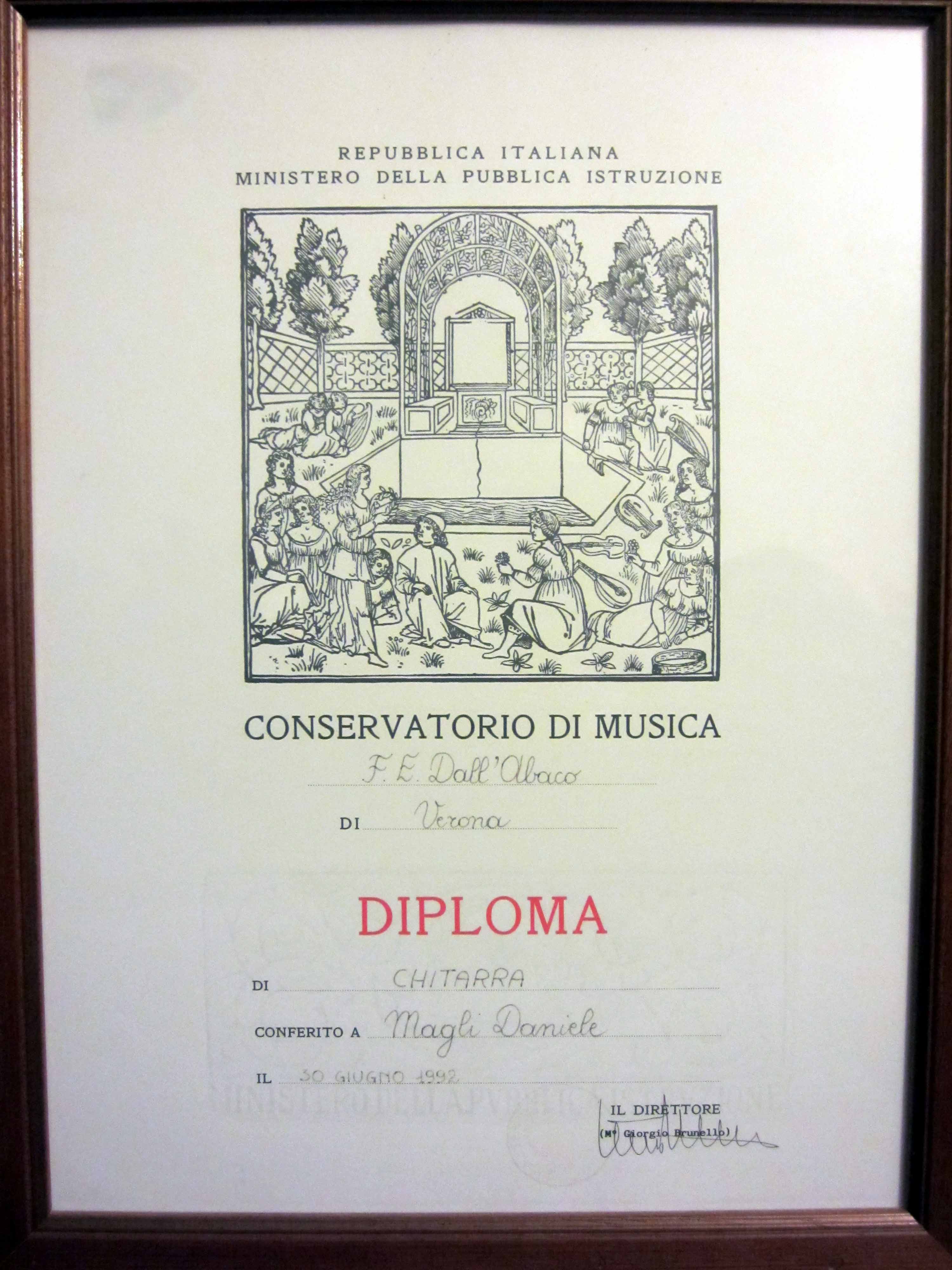
Interviewer: 'How do you begin playing classical guitar ?'
Daniele Magli : ' My parents bought an Andres Segovia's record 'Obras Breves Espanolas' and I used to listen to this Long Playing and it made me dream. It contains some pieces as 'Capricho Arabe', 'Arada', 'La filla del Marxant', 'Torre Bermeja' and I decided that I will have played all that pieces !'
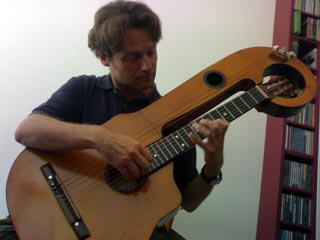
Daniele Magli playing an harp guitar built by Luigi Mozzani on 1925
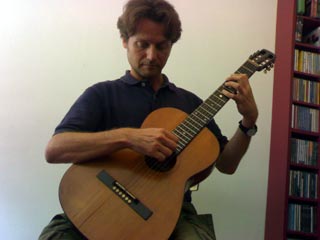
Daniele Magli playing a romantica guitar built by Luigi Mozzani on 1919
Interviewer : 'Was Andres Segovia your most important inspirer?'
Daniele Magli : 'Sure he was, and I was so lucky to see a concert of him in Venice at Scuola Grande di S. Giovanni Evangelista on November 16th 1985. There Andres Segovia played music by Tansman, Moreno Torroba, Granados, Ponce... That concert was a great emotion experience and I will remember it forever.'
Interviewer : 'Have you attended some Master Classes after the Conservatory?'
Daniele Magli : 'No. I'm not against Master Classes and it would be a plasure to study with John Williams or Angelo Gilardino. Anyway I do not regret that and when I'm at my best I like my style and my sound too.'
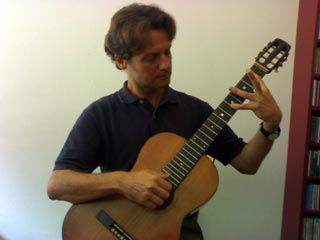
Interviewer : 'Who were your masters then..?'
Daniele Magli : 'I found three very good masters : the first was Tommaso De Nardis (Venice Conservatory) he told me everithing about Sor, Carulli and Tarrega's technique. The second one was Dino Doni, he studied with Ruggero Chiesa (Andres Segovia's apprentice), I studied with him Villa Lobos, Mauro Giuliani and Bach.
Interviewer : 'What about the third one ?'
Daniele Magli : 'The third master was myself ! When I rebegin to play I found I was very severe with myself. I read the technical instruction from Angelo Gilardino's manual applying his hints. Afterwards I played Angelo Gilardino's studies, they are fantastic to make stronger the left hand and to improove the music quality. Then I began to study Mario Castelnuovo Tedesco's works, 'Tarantella' and 'Capriccio Diabolico' in particular.'
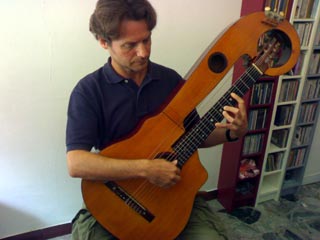
Interviewer : 'Who are the most important authors or methods you studied at the Conservatory ?'
Daniele Magli : 'During my first years "La escuela razonada de la guitarra" by Emilio Pujol (Four Volumes), Ferdinando Carulli's Method, "120 Arpeggios2 by Mauro Giuliani. Then I studied Op. 31 and Op. 35 by Fernando Sor (they are the famous studies choosed by Andrés Segovia).
Reginald Smith Brindle Method titled "Guitar Cosmos - Progressive Pieces for guitar with an introduction by Julian Bream" it was very important to understand contemporary music.
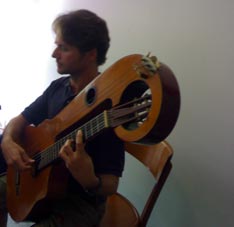
Interviewer : 'Is it true you to have a wide musical memory?'
Daniele Magli : 'As all classical guitarists I developed three kinds of memory: 1) visual memory, it's very important to visualize scores and to learn them by heart, 2) Tactile memory, I prefere to call it muscolar memory, 3) ear memory, I prefere to call it mind memory for sounds, this is the most important above all.'
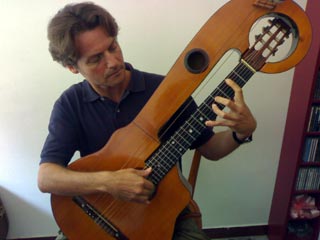
Interviewer : 'Is it possible to perform a concert playing half a repertoire by heart and half reading scores?'
Daniele Magli : 'Yes, sure, but fingering a piece it could be a conflict with playing by heart (this reffering to my experience of playing two - three hours a day, maybe those who are playing six hours a day as Andrés Segovia or John Williams are not affected at it). A lack of memory could happen because of thinking to something else : your mind go on solving fingering problems even when not playing the new piece you are working on. Avoid reading new scores three days before the concert but you could play any pieces although it should be by heart or you are reading it since a long time that's to use the same brain area'
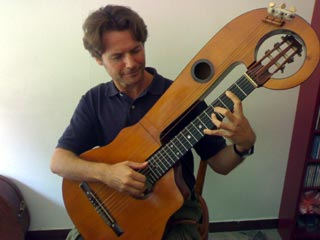
Interviewer : 'Are you able to keep at your best all the pieces you know by heart?'
Daniele Magli : 'No, it's not possible but at this topic let's point out some distinctions : one thing is your finger athletic shape playing classical guitar and another thing is the knowledge level of the piece you are studing. When your athetic shape level is above 70% it is sufficent a 60% knowledge level to reach a good performance, you could play the piece just three times a day for one week and then playing it to an audience or make a video: that's the way it worked for me in fandanguillo . But if your athletic level is about 40% (as it happens when not playing every day) you'll have to know the piece at 100%. Remember that having an athletic level at 40% you'll have to avoid virtuosism as quickness of playing, sound legatos, brilliant arpeggios and all will be harder and above all, you'll have to play the same piece six times a day at least and this will turn out very annoying.'
Daniele Magli in Calle de la Paz no.8 Madrid 2012
Interviewer : 'So wich should be the best way to reach a good shape?'
Daniele Magli : 'The most important thing is keep on playing every day and just skipping 20 days a year maximum. I mean, it's possible to have some holidays but not more then three weeks ! You could play technique, scales and your repertoire pieces or just pieces from your repertoire if including techniques as legato, rasgueado, arpeggio and barrè.'
Interviewer : 'I know you are receiving honours from all the world thanks to this site, did it happen the same in Italy?'
Daniele Magli : 'I was so honoured to receive compliments from Maestro Angelo Gilardino, he was impressed for the absolute worth of my interpretation. The greatest compliments I've ever received were from Prof. Angelo Zaniol (site author of www.joaopernambuco.com). Prof. Angelo Zaniol is used to ask me why I do not teach at the italian music conservatory.'
Interviewer : 'Why you do not teach at the music conservatory?'
Daniele Magli : 'I don't know why. I think it could be a good thing if I taught at the music conservatory just because I could be usefull to the young guitarists. However I'm available and if someone is going to call me I'm coming.'
Interviewer : 'Some
of your interpretations are really controversial.'
Daniele Magli : 'I've always suffered the performance rules strictness: not even the best performers are the interpretation truth owners. I usually try to escape the canonic interpretation when I play pieces as Lagrima by Francisco Tarrega or Choro by Heitor Villa-Lobos, and I do so just to avoid what Glenn Gould would have called Hollywoodian interpretation.
Interviewer : 'Are you influenced by the greatest classical guitarists?'
Daniele Magli : ' I take into account the
philological aspect as well as the guitar interpretatiion history : above
all I take into account of those guitarists we got records and live performances
and I do not quit to look for new ways and originality. When I usually
visualize a score I figure out my ideal interpretation and I sing it,
then I take the urtext score or the former score to achieve a change in
accent or an out of fashion rubato or a décalage or, we could say
a shift in the melody rithm according to accompaniment.
Just a talking machine could repeat as it is what is written in a score
but this, for sure, would not be satisfing for a composer.'
Interviewer : 'Aren't you worried about your interpretations, as they could be considered wrong?'
Daniele Magli : ' It's true,
that's the point, it exists a collective interpretation but
the tradition is nothing but the mistake sum as Artur Schnabel said.
To perform in a new way it is necessary to think big.
How many times we have heard that there is not one interpretation to fullfill
the piece essence? To find new ways to play classical guitar our own ideas
bravery is needed.'
Interviewer : 'Let's talk about your compositons for classical guitar'
Daniele Magli : 'On 2009 I felt the need to compose some studies for the right hand. That's how I wrote the 'Lunar Studies for the Right Hand Control'. The first study is 'Armstrong Moon', it's an arpeggio for the right hand agility. The Study number 2 is 'Apollo 11' and to play it I invented the plectrum thumb technique.'
Interviewer : 'What do you mean saying plectrum thumb technique?'
Daniele Magli : 'I use the thumb as a plectrum, playing with my nail upward as well, at the same time I use the right hand index to play the melody apoyando.'
Daniele Magli in the Ramirez shop in Madrid

Daniele Magli with Marco Maguolo luthier in Venice
Interviewer : 'And what about the Study number three?'
Daniele Magli : 'The study number three, the so called 'Sea of Tranquility' is played using the tremolo technique, but I change the rithm from 3/4 to 4/4 and to 7/8.'
Interviewer : 'And so were you inspired by the 1969 moon landing mission?'
Daniele Magli :' Yes, indeed. I was inspired by the 40th Moon Landing Anniversary, that was one small step for man, one giant leap for mankind.'
Apollo 11 arranged for orchetra by Daniele Magli
Interviewer: "I noticed that you first composed 'The Lunar Studies' on 2009 and aftewards some nwe pieces on 2010... are they all worthy technical pieces ?''
Daniele Magli: 'Yes, they all are good pieces to learn the classical guitar technique and they're good to learn the Daniele Magli style as well. For example 'Twilight' is a good piece to learn the arpeggio technique and the glissato one. Twilight is a really easy piece and it is downloaded by guitarists from the whole world. Among my easiest compositions there's 'Angels' as well, it is usefull to learn how to pass from an arpeggio to a scale'
Interviewer: ''I really like your composition called 'Ghost'... ''
Daniele Magli: '' 'Ghost' is usefull to learn the staccato technique and I think it's my best composition so far... When I wrote it, I was so inspired..''
Interviewer: ''I'm so impressed by the huge volume coming out your composition 'Summer love'...''
Daniele Magli: '''Summer Love' is infact a composition so important to learn the 'volumone' technique (huge volume)... it's a pieces to get a really strong right hand''
Interviewer: ''Your last composition are entitled 'Sci-Fi Studies' ''
Daiele Magli: ''It's a collection gathering 12 pieces dedicated to the Sci-Fi movies; 'Parallel Universe' shows its parallel octaves, it's a cross-over composition, it's a tricky composition to be played; 'Blue Galaxy' is usefull for the stretching technique while 'Lost in Space' is so funny to be played because of its fast legato technique. Maybe I'm going to realize soon some videos about this series: one among them is a dodecaphonic piece.'
Interviewer: ''What are you going to respond to whom call you as naif composer? ''
Daniele Magli: ''I like so much this definition as I think to myself as an instinctive composer. My composer adventure has just began and that's why I present my free .pdf scores at this link Daniele Magli music.''
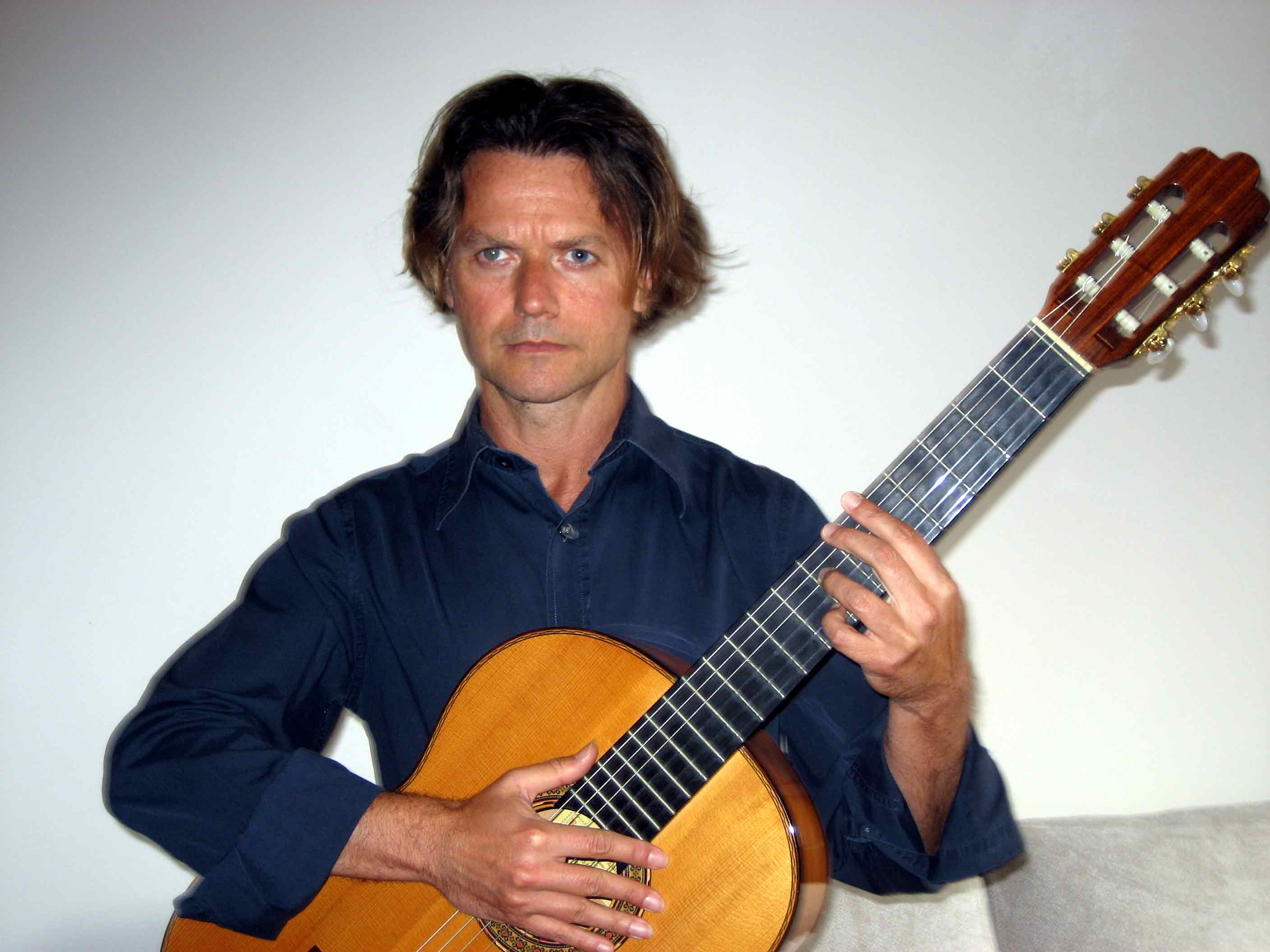
Interviewer: "There are a lot of guitar beginners out there and they're amazed by the fact you're able to learn a lot of pieces by heart without making mistakes when learning them: how is it possible?''
Daniele Magli: ''This is not true! I made some micro mistakes sometimes. Nowadays youtube's videos demonstrate how even the gratest guitarists make some little mistakes sometimes too: Andres Segovia or Julian Bream for example. Their interpretation are excellent anyway, but youtube gave us the great opportunity to overcome the 'never mistaking guitarist myth'. Maybe I understand what the guitar beginners mean: I'm going to tell you a story about this.''
Interviewer: "All right, that's really interesting! Please, go on."
Daniele Magli:
''A few years ago, when I was young, I found a work in Venice as a Guitarist
on Gondola. The gondolier told me: 'You can play the music you want but
the important thing is that you do not make mistakes'. I
was terrified and I told him: 'I've always made some mistakes and the
gondola sails on the little waves!'
And he said to me: 'No, mistake is when you stop. You should just keep
on playing! The mistake is when you stop"
Interviewer: "What an interesting Venetian Zen anecdote !"
Daniele Magli: ''Yes, you're right ! Playing on board gondolas tought me to memorize a lot of pieces about classical guitar as a huge repertoire was needed. However, the guitarist should become an absolute master of continuing as if mistakes had not happened when playing in front of an audience; he should act as if even his body language betrays no hint at all that he's just dropped a clanger or micro mistake. Getting out from mistakes is an art in itself."
Pics from Daniele Magli family about 1900.
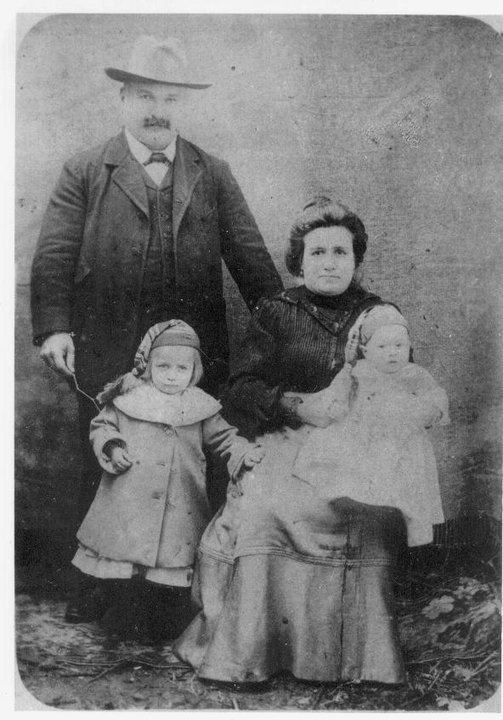
Interviewer: "I'm impressed by your set up, you seems to be very relaxed at playing, is there any secret about that ?"
Daniele Magli: ''When I'm at home I play with the same set up since years now, after becoming used to play in front of a camera, now I feel really relaxed. ''
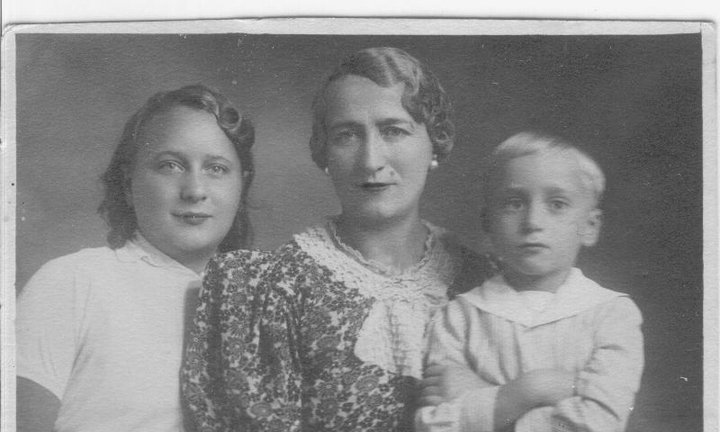
Interviewer : ''Are you saying that it's just a matter of being used to ? Is it the same when you play in concert ?''
Daniele Magli: ''Yes, but to be so relaxed I should play a lot of hours in concert. The most important thing for a classical guitarist is to acheive a good technique, because it gives you the way to reach the art of the instrument, and then you could become used to anything, as it could be playing in a concert a lot of pieces by heart . ''
Interviewer : ''As you are partially blind since when you were 10 years old, do you think this had helped you developing musical memory, or playing classical guitar ?''
Daniele Magli: ''A lot of guitarists go on asking me about this matter, and my answer is absolutely no. To be partially blind is such a thing that makes everything a little bit more difficoult in your everyday life, even playing classical guitar. We could say that great composers as Joaquin Rodrigo were blind, but Fernando Sor was in a good shape with sight ! I'm just kidding, we could think that all unlucky fatalities in our life could improve our music sensibility or give us more motivations. Referring to memorizing music, it's all about training, starting from short pieces towards longer ones. ''
Check out the Daniele Magli's classical guitar blog at http://danielemagli.blogspot.com
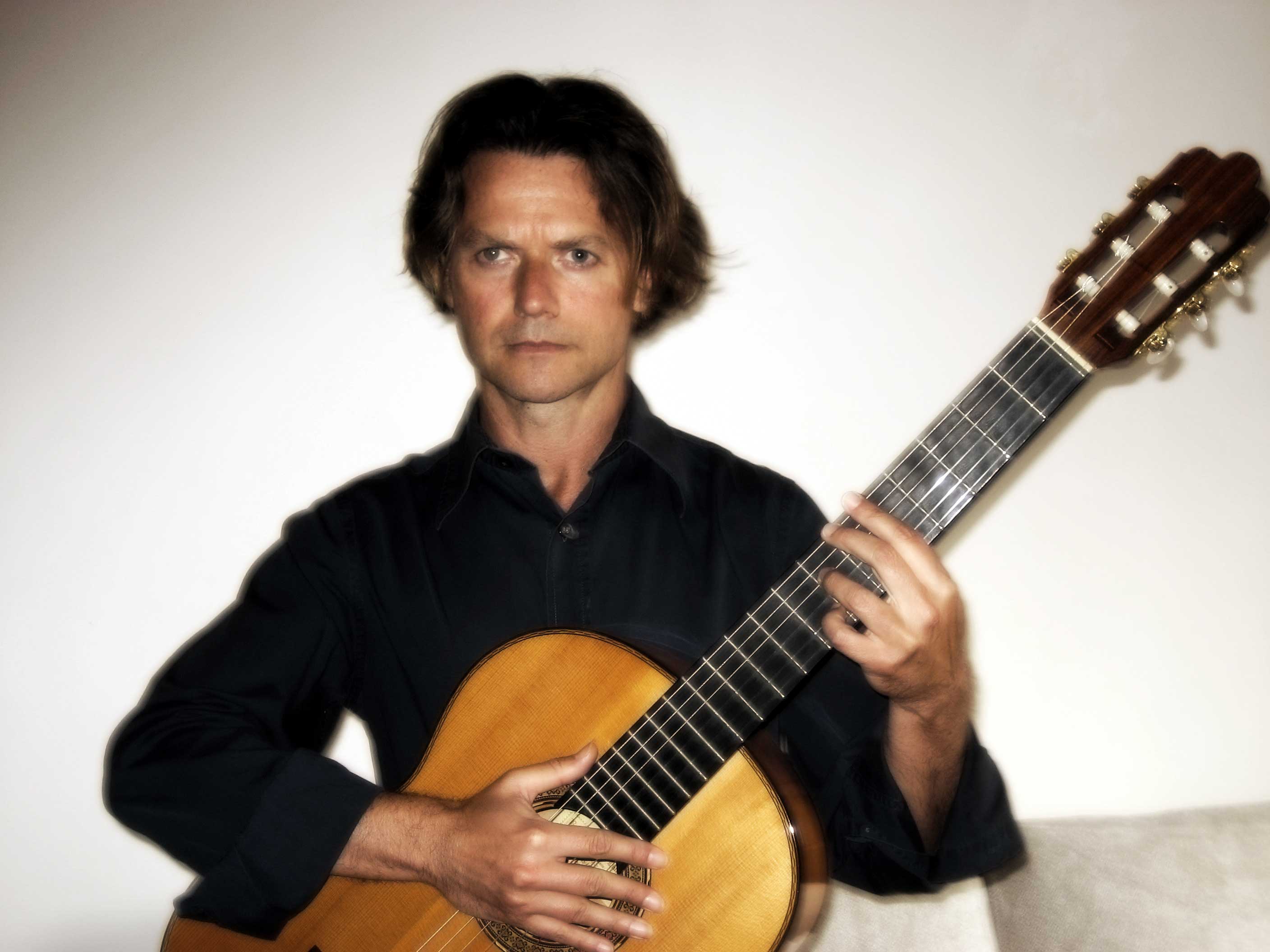
This interview
will go on soon, if you have some questions for Daniele Magli
you can write at ilgam77d[at]yahoo.it maybe your question will be added
to this interview. This
interview will go on soon, if you have some questions for Daniele Magli
you can write at ilgam77d[at]yahoo.it maybe your question will be added
to this interview.
|
|
|
|